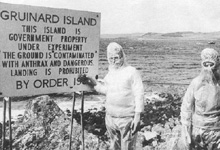
Tracks
Sturzstrom: "Gruinard"
Download (2009)
By George Bass | 11 September 2009
Operation Dark Harvest…nope, I don’t recall that one either. But, apparently, prior to Fathers For Justice doing Spider-Man stunts or vegans besieging power stations, UK environmental protest came in the form of some anonymous parcels of soil, innocently left in populated areas with a note reading Operation Dark Harvest. Doesn’t sound that anarchic, I know, but when you consider that the soil was ID’d as coming from the notorious Gruinard Island, MI5’s nerves began twitching. Gruinard had long been one of Britain’s best-kept dirty secrets, an uninhabited blip off the coast of western Scotland and a tomb for anything with lungs. In 1942, the Government—terrified that Hitler’s diabolical minds were on the brink of perfecting germ warfare—decided to test a little bio-bomb of their own, rendering the island fatally uninhabitable with a blast of Anthrax 14578. The locals, peeved that their land had been compulsory-purchased, garnished with poison, and abandoned to seething bacteria, sent batches of contaminated topsoil to the Cabinet, demanding the island be sterilised. Sure enough it was, although this recently declassified archive footage shows what a lark it all was to the generals: bloody locals should be proud we made use of them, don’t they know there’s a war on, etc.
I’m not sure if Terry Glancy is local (with a stage-name like Sturzstrom, I’m guessing not—it’s German for “sideways avalanche”), but he’ll almost certainly be championed by the Highland populous for writing a track that acknowledges Gruinard’s legacy. Neither protest song nor alternative opera (thank fuck), “Gruinard” is a spookily artificial nod to the bombing, crawling under one’s skin like LSD before breakfast with a beat that comes in after lunch. A delicate but malformed piano line wraps itself in splintered hip-hop—not unlike the runaway technique used by fellow Scots hermits Boards of Canada. The difference is, though, that this one’s lived in the soil for sixty-seven years and groans like a ghost awoken by Scooby. Vocals tremble with the burgeoning threat of epilepsy, made all the more unnerving and vaguely alien by the persistent squawling of seabirds (a little historical inaccuracy there: records show the only animals to survive on Gruinard were a hardy strain of rabbits, burrowing steadily through spore-ridden earth like the horny little battery mascots they are). Still, like Frog Pocket, Christ, and the Krankies, “Gruinard” is a dinky little nod to the darker side of Scottish music and goes to show what can go wrong when the eggheads whisk themselves into a frenzy. Never explode biological weapons downwind of an armed farmer’s flock. A lesson there for all of us.





